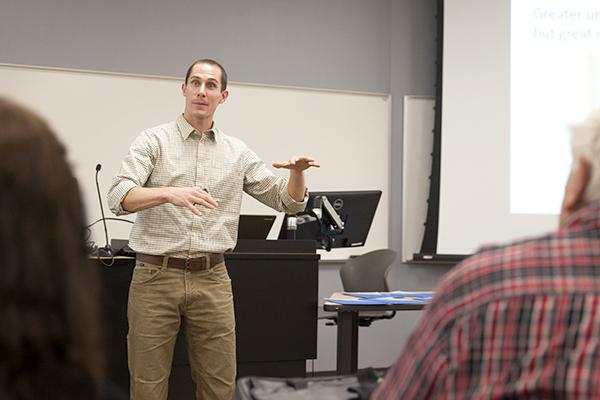A mix of students, faculty and community members gathered in Jamrich Hall on Nov. 13 to hear Stephen Handler of the Northern Institute of Applied Climate Science (NIACS) speak about climate change.
Many of the attendees were foresters or owners of forest land. Handler commanded the audience’s attention with his engaging lecture on the effects of global climate change on forests in the U.P. and the upper Midwest as a whole.
“Wherever you are in the U.P., you’re not far from a forest,” Handler said.
Handler was introduced by Jessica Thompson, assistant professor of communication studies at NMU.
“I think this was one of our best attended events. I think that Stephen Handler used wonderful scientific communication,” Thompson said.
Handler stressed the importance of preserving forests for future generations.
“We’re dealing with legacies that can be passed on from generation to generation when we’re talking about forest land,” Handler said.
Handler spoke of the general trend toward more extreme types of precipitation and climate fluctuations, particularly the tendency for temperatures to increase.
“We’ve got warmer winters, and it’s going to be warmer during the growing season,” Handler said.
He reminded the audience of the vital importance of forests in the economy and culture of the Upper Peninsula, saying, “We all have a stake in how we can keep our forests vital and vigorous into the future.”
The future of climate change is quite uncertain, Handler said.
“Science is never going to be precise enough and certain enough that you’re going to have that crystal ball for what happens to our forests.”
Because of this uncertainty, it is important to implement strategies for combating climate change in the present before it becomes irreversible.
Thankfully there are a number of methods that may be employed in order to protect the forest system and offset global climate change.
NIACS collaborates with the U.S. Forest Service, forest-related industries and universities to provide information on impacts of global climate change on forest land.
They also work to provide strategies for mitigating the adverse effects of climate change.
Their website contains a plethora of information on the subject, from basic causes of climate change to more advanced topics.
Indeed, there was quite a full audience, and Handler’s speech was clear and accessible to those who might not have been versed in the topics covered. It was an informative presentation on a subject of utmost importance, not only for the Upper Peninsula, but for the world as a whole.























